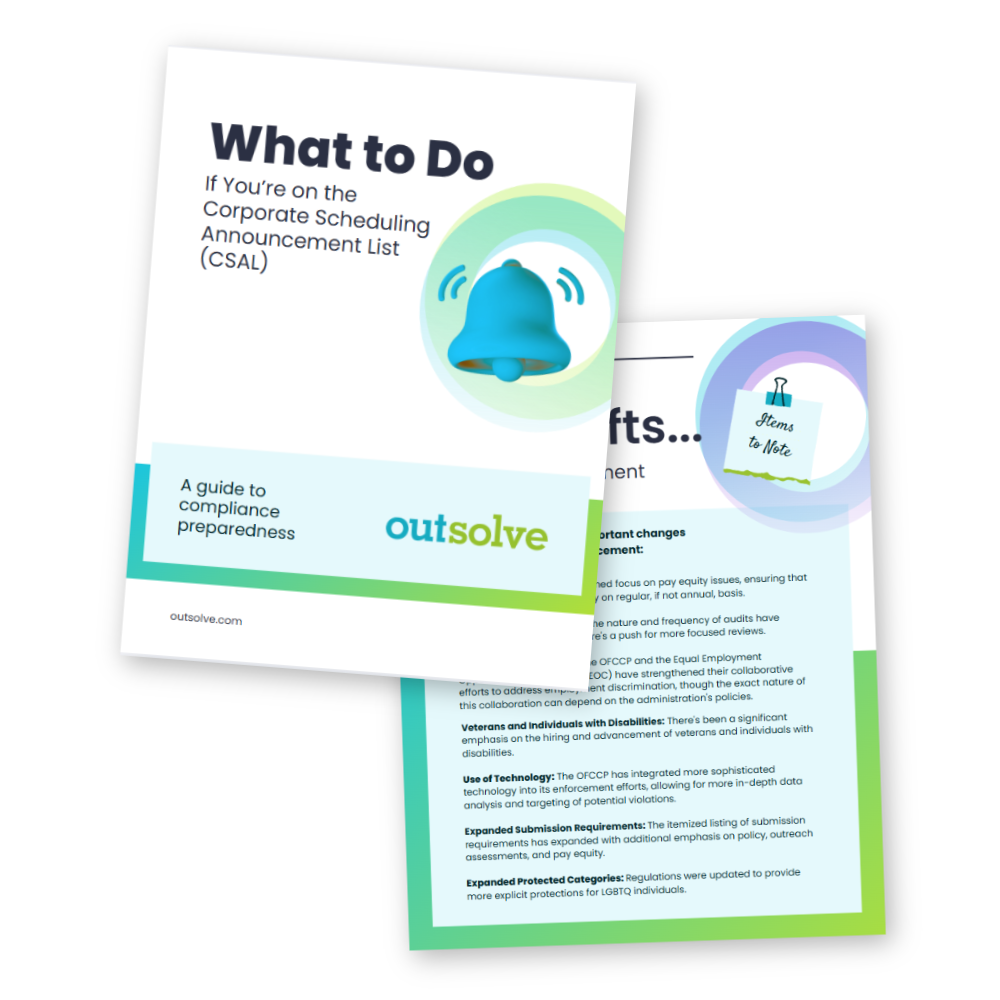WHAT IS THE CSAL
Understanding the Corporate Scheduling Announcement List (CSAL)
The Corporate Scheduling Announcement List (CSAL) is a courtesy notification sent to contractors selected for a compliance evaluation by the Office of Federal Contract Compliance Programs (OFCCP). This list is sent ahead of the official OMB-approved Scheduling Letter to help you prepare for the evaluation process.

.png?width=450&height=450&name=man-looking-atlaptop%20(3).png)
Why Does It Matter?
Receiving a CSAL notification means your establishment has been selected to undergo a compliance review. This is your chance to prepare and ensure that you meet all federal requirements. Understanding the CSAL can help you navigate the compliance landscape more efficiently.
Additional Resources
CSAL Frequently Asked Questions:
What is the difference between the CSAL and a Scheduling Letter?
The CSAL is a courtesy notification offering resources and assistance. The Scheduling Letter initiates the compliance evaluation process. The Scheduling letter alerts a particular federal contractor establishment that is has been selected for a compliance review.
What was the methodology used for developing the Supply and Service Scheduling List FY 2025, Release-1?
The OFCCP used a detailed methodology to create the FY 2025 CSAL. Only contracts worth $50,000 or more, as identified on USAspending.gov, were included. Contracts with federal, state, and local governments, school districts, construction-only contractors, and healthcare contracts under TRICARE and Veterans Affairs moratoriums were excluded. Establishments in the U.S. with at least 400 employees and those in U.S. territories with 50 employees were selected for consideration. Establishments with the largest employee counts within each district office jurisdiction, based on 2022 EEO-1 filings, were targeted. Establishments already under review, in a conciliation agreement monitoring period, within an exemption period following a closed review, pending review from prior lists, or covered by an active facilities waiver were removed. The list was capped at 10 establishments per parent company, with additional restrictions on hospital and university reviews by region and no more than four FAAP reviews per parent company.
How are CMCE establishments chosen for evaluation?
In 2025, the OFCCP focused on contractors and subcontractors with the largest employee counts within each district office’s area, using 2022 EEO-1 filings to confirm employee numbers. The pool included parent companies with contracts of $50,000 or more, U.S. establishments with at least 500 employees, establishments in U.S. territories with at least 150 employees, and FAAP units with at least 300 employees. For financial institutions, the OFCCP relied on data from the FDIC’s public database of FDIC-insured banks, including employee counts and addresses.
My company had an establishment on a previous Supply and Service scheduling list but was later removed. How does this impact the timeline for this establishment to be reviewed in the future?
If your establishment hasn't completed a review or progress report monitoring in the last two years, it might be included now or in future scheduling lists.
How does the OFCCP decide on the size and frequency of the scheduling list?
This is determined by the agency’s workload and resources, with lists of prior years ranging from 400 to 5,000 establishments.
How are compliance reviews for multiple establishments of a company coordinated?
They're assigned to the same region for coordination. A parent company may have additional establishments scheduled from previous scheduling lists.
Is there a limit on the number of establishments scheduled per contractor?
Legally, no. However, OFCCP might set its own limits based on resources and the need for diverse reviews.
Can an establishment undergo a review without receiving a CSAL?
Yes, especially if the review is due to a complaint, contract award notice, or monitoring of a conciliation agreement or consent decree progress report monitoring.
What is the reason for different limits on establishments per parent company in scheduling lists?
The size of the scheduling list and various methodologies play a role in this determination. The OFCCP scrutinizes the impact of different approaches to its scheduling methods.
Can a corporate headquarters undergo an establishment-level evaluation?
Yes, there's no legal prohibition against it.
What if the establishment remains on the CSAL list even after removal confirmation?
Even if exempted from review, the establishment remains on the CSAL list for neutral scheduling purposes. The CSAL is not edited to reflect the change.
How can a contractor get more information on the compliance evaluation process?
You should direct questions about the compliance evaluation process to your OFCCP's district or regional office. Contact information is available on the Regional Office Directory webpage. You're also encouraged to attend OutSolve's webinar on the new OFCCP Combined Scheduling Letter and Itemized Listing- register here.
Important Things to Note
- No Limits: There is no legal limit on the number of establishments per contractor that can be scheduled for a compliance review.
- Incorrect Information: If the CSAL contains incorrect establishment information, it is possible to correct this by contacting OFCCP.
- For Universities: Reviews cover entire campuses in a single city but do not include affiliated hospitals or campuses in different cities.
Don't Forget Your CSAL Guide
Receiving a CSAL notification means your establishment has been selected to undergo a compliance review. This is your chance to prepare and ensure that you meet all federal requirements. Understanding the CSAL can help you navigate the compliance landscape more efficiently.

How Can OutSolve Help?
Navigating through the complexities of compliance evaluations can be daunting. OutSolve specializes in helping organizations like yours successfully prepare for and navigate through these evaluations. From understanding the CSAL to completing the evaluation, we're here to assist you every step of the way.